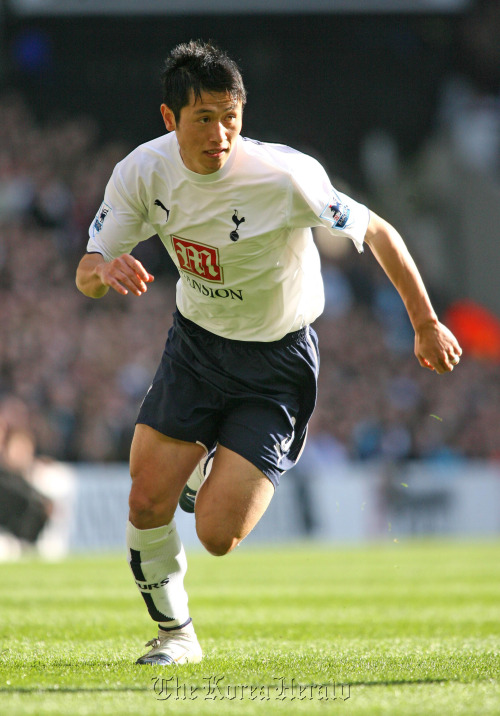Veteran Korean defender weighs up his next move
Lee Young-pyo’s place in the history of Korean soccer was assured a long time ago.
Perhaps it was due to his performances at the 2002 World Cup, or maybe fans will remember the 2006 and 2010 editions just as much.
It is not only the 127 appearances he made for his country but the fact that he won the K-League title with Anyang Cheetahs in 2000, won two Dutch titles and went to the semifinals of the 2005 UEFA Champions League with PSV Eindhoven.

Lee Young-pyo (The Korea Herald)
He then earned a move to Tottenham Hotspur, one of the glamour clubs of the English Premier League, in 2005. After three good years in London he spent time with German powerhouse Borussia Dortmund before two years with Saudi Arabia’s Al Hilal.
After that time in Riyadh, he is now taking a breather and weighing up his next move. At the age of 34 there is not much time left ― enough, perhaps, for one more move. Offers have come in from many different clubs in Europe, the Middle East and also his homeland. He still hasn’t decided what to do. He may decide to call it a day altogether after retiring from international soccer as soon as the 2011 Asian Cup ended in January.
With all the Korean and Asian players preparing for a new European season, it is easy to forget that Lee was one of the first, heading west with Park Ji-sung in 2002. The defender, who usually played on the left side of the backline but was versatile to play in a number of positions on the field, adapted to life in Europe well with only the occasional but inevitable hiccup.
“There is a difference in culture,” he said over coffee near Konkuk University where he started out as a player. “If you lose in Europe, there is a tendency to blame someone for the loss. In Korea, it is not like that. Football is a team sport and the culture is that if your colleagues or coach make a mistake, it is a team mistake and my mistake. I think it is an advantage that Korean players have and one of the reasons that coaches such as Guus Hiddink and Alex Ferguson like Korean players.
“I don’t mean that European players are selfish, it is just a different culture. The first time, someone told me that I had made a mistake I was very angry and upset but a little later I understood. This is a different culture, it’s not personal and after the game in the dressing room and everything is forgotten.”
Things have changed. In the nine years since Lee and Park went to PSV Eindhoven, one of the biggest clubs in the Netherlands and a former European champion, Korean players tend to move when they are younger and prefer to go straight to the big leagues such as England. Lee believes that the most direct route is not always the best.
“For young Asian players, there is going to be a big cultural difference and it takes time to adjust to that. The Dutch league is a very good stepping stone to learn and if you can do well there and adjust there then you can go anywhere,” he says.
“The English Premier League is one of the biggest leagues and you have top quality players and top teams, they are so good at finding the way to win and get the result. In Holland, they teach the player the essence of football and what it is about, not just about winning. Ji Dong-won could do well in England but for me, Netherlands is better.
“In England, the focus is on how to win. In the Netherlands, they teach us how to play football. For a young player, this is the most important thing.”
In his time in Holland, Lee continued to play under Guus Hiddink. The Dutchman had taken Korea to the last four of the 2002 World Cup and then took Lee and Park back home. Lee has played under a number of coaches but names Hiddink as his favorite.
“Our performances were at a consistently high level at the 2002 World Cup,” recalled Lee. “He is very clever, he knows how to catch the players’ minds and get everyone playing together. With PSV, we met a strong team in the UEFA Champions League and we were a little afraid before the game but Hiddink said something and everyone’s expression changed and they all started to believe. He could change the mentality very quickly.”
Lee was part of the team that reached the second round of the 2010 World Cup, the first time the team managed such a feat on foreign soil. Huh Jung-moo was the coach in charge then and gave way to Cho Kwang-rae who took the team to third in January’s Asian Cup and is preparing for the qualification campaign in preparation for the 2014 World Cup in Brazil.
“Huh Jung-moo has a very special ability to get the attention of the players and ensure that they are focused. The current coach Cho has a superb ability to analyze the match in supreme detail and he passes that on to the players. They have two different styles but both will go down in Korean history as two of the best.”
Something similar could be said of Lee Young-pyo. If the new generation of young players going to Europe have a career as half as good as the veteran defender then they will not have done badly at all.
By John Duerden, Contributing writer (
johnduerden@hotmail.com)






